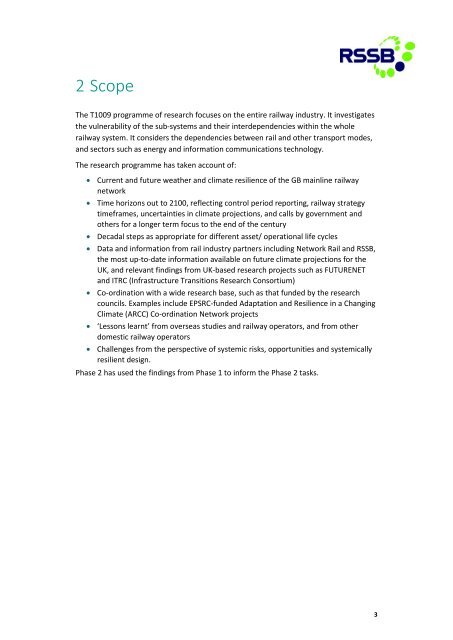Tomorrow's Railway and Climate Change Adaptation Final Report
2016-05-T1009-final-report
2016-05-T1009-final-report
Create successful ePaper yourself
Turn your PDF publications into a flip-book with our unique Google optimized e-Paper software.
2 Scope<br />
The T1009 programme of research focuses on the entire railway industry. It investigates<br />
the vulnerability of the sub-systems <strong>and</strong> their interdependencies within the whole<br />
railway system. It considers the dependencies between rail <strong>and</strong> other transport modes,<br />
<strong>and</strong> sectors such as energy <strong>and</strong> information communications technology.<br />
The research programme has taken account of:<br />
• Current <strong>and</strong> future weather <strong>and</strong> climate resilience of the GB mainline railway<br />
network<br />
• Time horizons out to 2100, reflecting control period reporting, railway strategy<br />
timeframes, uncertainties in climate projections, <strong>and</strong> calls by government <strong>and</strong><br />
others for a longer term focus to the end of the century<br />
• Decadal steps as appropriate for different asset/ operational life cycles<br />
• Data <strong>and</strong> information from rail industry partners including Network Rail <strong>and</strong> RSSB,<br />
the most up-to-date information available on future climate projections for the<br />
UK, <strong>and</strong> relevant findings from UK-based research projects such as FUTURENET<br />
<strong>and</strong> ITRC (Infrastructure Transitions Research Consortium)<br />
• Co-ordination with a wide research base, such as that funded by the research<br />
councils. Examples include EPSRC-funded <strong>Adaptation</strong> <strong>and</strong> Resilience in a Changing<br />
<strong>Climate</strong> (ARCC) Co-ordination Network projects<br />
• ‘Lessons learnt’ from overseas studies <strong>and</strong> railway operators, <strong>and</strong> from other<br />
domestic railway operators<br />
• Challenges from the perspective of systemic risks, opportunities <strong>and</strong> systemically<br />
resilient design.<br />
Phase 2 has used the findings from Phase 1 to inform the Phase 2 tasks.<br />
3


